Related Research Articles

Wuppertal is, with a population of approximately 355,000, the seventh-largest city in North Rhine-Westphalia as well as the 17th-largest city of Germany. It is regarded as the capital and largest city of the Bergisches Land.

Elberfeld is a municipal subdivision of the German city of Wuppertal; it was an independent town until 1929.
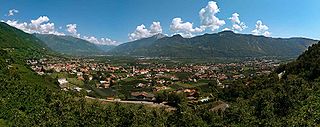
Lana is a comune (municipality) in South Tyrol in northern Italy. It is situated in the Etschtal between Bolzano and Merano and at the entrance to the Ultental. The population rose to 12,566 in 2020.
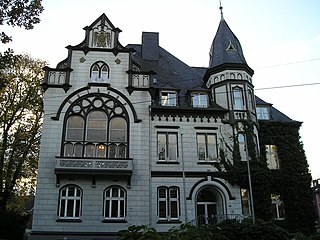
Haan is a town in the district of Mettmann, in North Rhine-Westphalia, Germany. It is situated at the western edge of the Bergisches Land, 12 km southwest of Wuppertal and 17 km east of Düsseldorf. In 1975, Gruiten was incorporated into Haan.

Meran or Merano is a city and comune in South Tyrol, northern Italy. Generally best known for its spa resorts, it is located within a basin, surrounded by mountains standing up to 3,335 metres above sea level, at the entrance to the Passeier Valley and the Vinschgau.

The Wuppertaler Schwebebahn is a suspension railway in Wuppertal, Germany.

Chloroquine is a medication primarily used to prevent and treat malaria in areas where malaria remains sensitive to its effects. Certain types of malaria, resistant strains, and complicated cases typically require different or additional medication. Chloroquine is also occasionally used for amebiasis that is occurring outside the intestines, rheumatoid arthritis, and lupus erythematosus. While it has not been formally studied in pregnancy, it appears safe. It was studied to treat COVID-19 early in the pandemic, but these studies were largely halted in the summer of 2020, and is not recommended for this purpose. It is taken by mouth.

Hydroxychloroquine, sold under the brand name Plaquenil among others, is a medication used to prevent and treat malaria in areas where malaria remains sensitive to chloroquine. Other uses include treatment of rheumatoid arthritis, lupus, and porphyria cutanea tarda. It is taken by mouth, often in the form of hydroxychloroquine sulfate.

Friedrich Bayer was the founder of what would become Bayer, a German chemical and pharmaceutical company. He founded the dyestuff factory Friedrich Bayer along with Johann Friedrich Weskott in 1863 in Elberfeld, a flourishing city in the early industrialised region of the Wuppertal or Wupper Valley.
During the Second World War, the city of Wuppertal suffered numerous Allied air raids, primarily nighttime attacks from the Royal Air Force's Bomber Command during its Battle of the Ruhr bomber offensive. The largest raids were on the night of 29-30 May 1943, heavy enough to cause a firestorm, and on 24-25 June. The wartime-era German Feuerwehr fire brigades were ill-equipped to fight the fires. The RAF's airstrikes destroyed areas of Wuppertal's north-eastern Barmen, central Elberfeld and south-eastern Ronsdorf communities, mainly through incendiary area bombing, resulting in destructive firestorms. Other Allied aircraft also carried out numerous smaller air raids on Wuppertal. Overall, more than 6,500 people lost their lives during World War II in Wuppertal from such raids; 38 percent of the built-up urban area was destroyed.
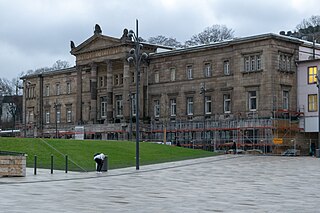
Wuppertal Hauptbahnhof is a railway station in the city of Wuppertal, just south of the Ruhr Area, in the German state of North Rhine-Westphalia. It is on the line between Düsseldorf/Cologne and Dortmund. The 1848 reception building is one of the oldest of its kind. The station was originally Elberfeld station and has been renamed several times since. Since 1992, it has been called Wuppertal Hauptbahnhof. Wuppertal Hauptbahnhof is also the site of lost luggage operations for Deutsche Bahn.

The Von der Heydt Museum is a museum in Wuppertal, Germany.
Johann Michael Bach was a German composer, lawyer and music theorist.
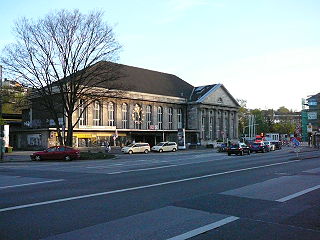
Wuppertal-Barmen station is a station in the city of Wuppertal in the German state of North Rhine-Westphalia on the Elberfeld–Dortmund railway. Its entrance building is protected as a monument. It was Barmen Hauptbahnhof prior to Barmen's incorporation in Wuppertal in 1929. Before the Second World War it was an important stop for express trains and had substantial freight traffic. Its importance declined after the war in favour of Oberbarmen and since the renaming of the Elberfeld station as Wuppertal Hauptbahnhof. The Opernhaus Wuppertal is nearby.
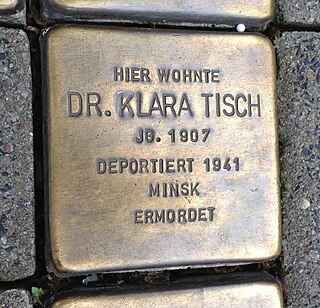
Cläre Tisch, also "Kläre Tisch" or "Klara Tisch," was a German economist.
Wilhelm Neumann-Torborg was a German sculptor whose works are still well-known.
Hermann Gerhard Weyland was a German chemist and botanist. In collaboration with Richard Kräusel, he carried out significant paleobotanical investigations of Devonian flora.
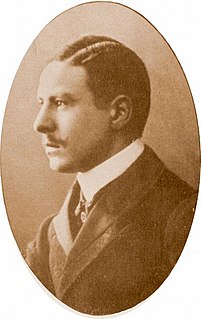
Oskar Erbslöh was a German aviation pioneer.

The Geologist is an glue paint on paper on canvas painting by the German painter Carl Spitzweg executed c. 1860. It belongs to the collection of the Von der Heydt Museum in Wuppertal, to which it was bequeathed in 1913. Spitzweg's style of painting belongs to the late Romantic period.
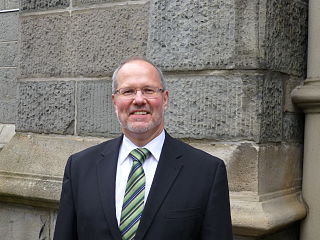
Thorsten Pech is a German church musician.
References
- ↑ Krafts K, Hempelmann E, Skórska-Stania A (2012). "From methylene blue to chloroquine: a brief review of the development of an antimalarial therapy". Parasitol Res. 111 (1): 1–6. doi:10.1007/s00436-012-2886-x. PMID 22411634. S2CID 54526057.
- ↑ Dünschede HB (1971). "Tropenmedizinische Forschung bei Bayer". Schadewaldt H (Edit.): Düsseldorfer Arbeiten zur Geschichte der Medizin.

